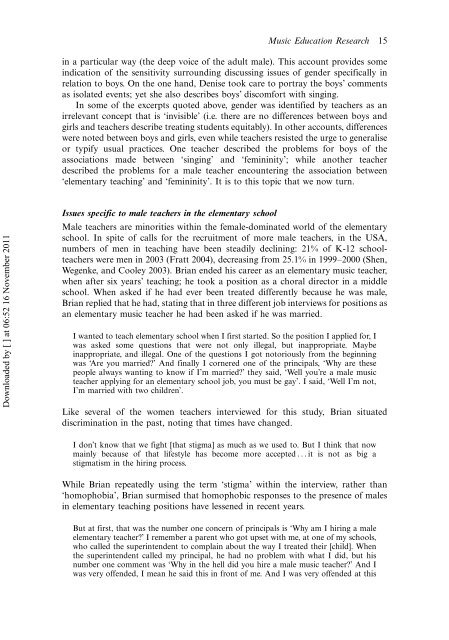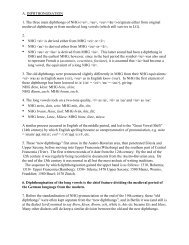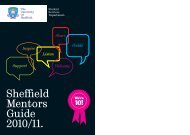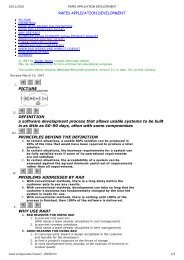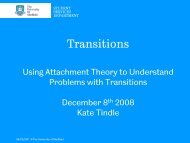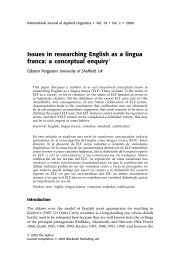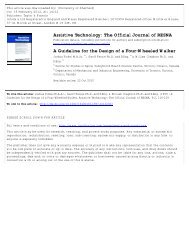Music teachers' constructions of gender in elementary education
Music teachers' constructions of gender in elementary education
Music teachers' constructions of gender in elementary education
You also want an ePaper? Increase the reach of your titles
YUMPU automatically turns print PDFs into web optimized ePapers that Google loves.
Downloaded by [ ] at 06:52 16 November 2011<br />
<strong>Music</strong> Education Research 15<br />
<strong>in</strong> a particular way (the deep voice <strong>of</strong> the adult male). This account provides some<br />
<strong>in</strong>dication <strong>of</strong> the sensitivity surround<strong>in</strong>g discuss<strong>in</strong>g issues <strong>of</strong> <strong>gender</strong> specifically <strong>in</strong><br />
relation to boys. On the one hand, Denise took care to portray the boys’ comments<br />
as isolated events; yet she also describes boys’ discomfort with s<strong>in</strong>g<strong>in</strong>g.<br />
In some <strong>of</strong> the excerpts quoted above, <strong>gender</strong> was identified by teachers as an<br />
irrelevant concept that is ‘<strong>in</strong>visible’ (i.e. there are no differences between boys and<br />
girls and teachers describe treat<strong>in</strong>g students equitably). In other accounts, differences<br />
were noted between boys and girls, even while teachers resisted the urge to generalise<br />
or typify usual practices. One teacher described the problems for boys <strong>of</strong> the<br />
associations made between ‘s<strong>in</strong>g<strong>in</strong>g’ and ‘fem<strong>in</strong><strong>in</strong>ity’; while another teacher<br />
described the problems for a male teacher encounter<strong>in</strong>g the association between<br />
‘<strong>elementary</strong> teach<strong>in</strong>g’ and ‘fem<strong>in</strong><strong>in</strong>ity’. It is to this topic that we now turn.<br />
Issues specific to male teachers <strong>in</strong> the <strong>elementary</strong> school<br />
Male teachers are m<strong>in</strong>orities with<strong>in</strong> the female-dom<strong>in</strong>ated world <strong>of</strong> the <strong>elementary</strong><br />
school. In spite <strong>of</strong> calls for the recruitment <strong>of</strong> more male teachers, <strong>in</strong> the USA,<br />
numbers <strong>of</strong> men <strong>in</strong> teach<strong>in</strong>g have been steadily decl<strong>in</strong><strong>in</strong>g: 21% <strong>of</strong> K-12 schoolteachers<br />
were men <strong>in</strong> 2003 (Fratt 2004), decreas<strong>in</strong>g from 25.1% <strong>in</strong> 1999 2000 (Shen,<br />
Wegenke, and Cooley 2003). Brian ended his career as an <strong>elementary</strong> music teacher,<br />
when after six years’ teach<strong>in</strong>g; he took a position as a choral director <strong>in</strong> a middle<br />
school. When asked if he had ever been treated differently because he was male,<br />
Brian replied that he had, stat<strong>in</strong>g that <strong>in</strong> three different job <strong>in</strong>terviews for positions as<br />
an <strong>elementary</strong> music teacher he had been asked if he was married.<br />
I wanted to teach <strong>elementary</strong> school when I first started. So the position I applied for, I<br />
was asked some questions that were not only illegal, but <strong>in</strong>appropriate. Maybe<br />
<strong>in</strong>appropriate, and illegal. One <strong>of</strong> the questions I got notoriously from the beg<strong>in</strong>n<strong>in</strong>g<br />
was ‘Are you married?’ And f<strong>in</strong>ally I cornered one <strong>of</strong> the pr<strong>in</strong>cipals, ‘Why are these<br />
people always want<strong>in</strong>g to know if I’m married?’ they said, ‘Well you’re a male music<br />
teacher apply<strong>in</strong>g for an <strong>elementary</strong> school job, you must be gay’. I said, ‘Well I’m not,<br />
I’m married with two children’.<br />
Like several <strong>of</strong> the women teachers <strong>in</strong>terviewed for this study, Brian situated<br />
discrim<strong>in</strong>ation <strong>in</strong> the past, not<strong>in</strong>g that times have changed.<br />
I don’t know that we fight [that stigma] as much as we used to. But I th<strong>in</strong>k that now<br />
ma<strong>in</strong>ly because <strong>of</strong> that lifestyle has become more accepted ...it is not as big a<br />
stigmatism <strong>in</strong> the hir<strong>in</strong>g process.<br />
While Brian repeatedly us<strong>in</strong>g the term ‘stigma’ with<strong>in</strong> the <strong>in</strong>terview, rather than<br />
‘homophobia’, Brian surmised that homophobic responses to the presence <strong>of</strong> males<br />
<strong>in</strong> <strong>elementary</strong> teach<strong>in</strong>g positions have lessened <strong>in</strong> recent years.<br />
But at first, that was the number one concern <strong>of</strong> pr<strong>in</strong>cipals is ‘Why am I hir<strong>in</strong>g a male<br />
<strong>elementary</strong> teacher?’ I remember a parent who got upset with me, at one <strong>of</strong> my schools,<br />
who called the super<strong>in</strong>tendent to compla<strong>in</strong> about the way I treated their [child]. When<br />
the super<strong>in</strong>tendent called my pr<strong>in</strong>cipal, he had no problem with what I did, but his<br />
number one comment was ‘Why <strong>in</strong> the hell did you hire a male music teacher?’ And I<br />
was very <strong>of</strong>fended, I mean he said this <strong>in</strong> front <strong>of</strong> me. And I was very <strong>of</strong>fended at this


